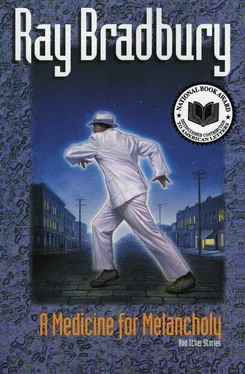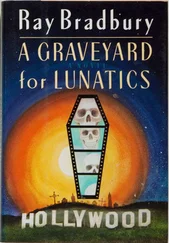And the mother went upstairs.
Now the Dustman backed off, bowing courteously to all.
“All night, now, remember, beneath the moon, not the slightest disturbance until dawn. Sleep well, young lady. Dream, and dream the best. Good night.”
Soot was lost in soot; the man was gone.
Mr. Wilkes and Jamie kissed Camillia’s brow.
“Father, Jamie,” she said. “Don’t worry.”
And she was left alone to stare off where at a great distance she thought she saw a smile hung by itself in the dark blink off and on, then go round a corner, vanishing.
She waited for the rising of the moon.
Night in London, the voices growing drowsier in the inns, the slamming of doors, drunken farewells, clocks chiming. Camillia saw a cat like a woman stroll by in her furs, saw a woman like a cat stroll by, both wise, both Egyptian, both smelling of spice. Every quarter hour or so a voice drifted down from above:
“You all right, child?”
“Yes, Father.”
“Camillia?”
“Mother, Jamie, I’m fine.”
And at last. “Good night.”
“Good night.”
The last lights out. London asleep.
The moon rose.
And the higher the moon, the larger grew Camillia’s eyes as she watched the alleys, the courts, the streets, until at last, at midnight, the moon moved over her to show her like a marble figure atop an ancient tomb.
A motion in darkness.
Camillia pricked her ears.
A faint melody sprang out on the air.
A man stood in the shadows of the court.
Camillia gasped.
The man stepped forth into moonlight, carrying a lute which he strummed softly. He was a man well-dressed, whose face was handsome and, now anyway, solemn.
“A troubadour,” said Camillia aloud.
The man, his finger on his lips, moved slowly forward and soon stood by her cot.
“What are you doing out so late?” asked the girl, unafraid but not knowing why.
“A friend sent me to make you well.” He touched the lute strings. They hummed sweetly. He was indeed handsome there in the silver light.
“That cannot be,” she said, “for it was told me, the moon is my cure.”
“And so it will be, maiden.”
“What songs do you sing?”
“Songs of spring nights, aches and ailments without name. Shall I name your fever, maiden?”
“If you know it, yes.”
“First, the symptoms: raging temperatures, sudden cold, heart fast then slow, storms of temper, then sweet calms, drunkenness from having sipped only well water, dizziness from being touched only thus —”
He touched her wrist, saw her melt toward delicious oblivion, drew back.
“Depressions, elations,” he went on. “Dreams—”
“Stop!” she cried, enthralled. “You know me to the letter. Now, name my ailment!”
“I will.” He pressed his lips to the palm of her hand so she quaked suddenly. “The name of the ailment is Camillia Wilkes.”
“How strange.” She shivered, her eyes glinting lilac fires. “Am I then my own affliction? How sick I make myself! Even now, feel my heart!”
“I feel it, so.”
“My limbs, they burn with summer heat!”
“Yes. They scorch my fingers.”
“But now, the night wind, see how I shudder, cold! I die, I swear it, I die!”
“I will not let you,” he said quietly.
“Are you a doctor, then?”
“No, just your plain, your ordinary physician, like another who guessed your trouble this day. The girl who would have named it but ran off in the crowd.”
“Yes, I saw in her eyes she knew what had seized me. But, now, my teeth chatter. And no extra blanket!”
“Give room, please. There. Let me see: two arms, two legs, head and body. I’m all here!”
“What, sir!”
“To warm you from the night, of course.”
“How like a hearth! Oh, sir, sir, do I know you? Your name?”
Swiftly above her, his head shadowed hers. From it his merry clear-water eyes glowed as did his white ivory slot of a smile.
“Why, Bosco, of course,” he said.
“Is there not a saint by that name?”
“Given an hour, you will call me so, yes.”
His head bent closer. Thus sooted in shadow, she cried with joyous recognition to welcome her Dustman back.
“The world spins! I pass away! The cure, sweet Doctor, or all is lost!”
“The cure,” he said. “And the cure is this …”
Somewhere, cats sang. A shoe, shot from a window, tipped them off a fence. Then all was silence and the moon …
“Shh …”
Dawn. Tiptoeing downstairs, Mr. and Mrs. Wilkes peered into their courtyard.
“Frozen stone dead from the terrible night, I know it!”
“No, wife, look! Alive! Roses in her cheeks! No, more! Peaches, persimmons! She glows all rosy-milky! Sweet Camillia, alive and well, made whole again!”
They bent by the slumbering girl.
“She smiles, she dreams; what’s that she says?”
“The sovereign,” sighed the girl, “remedy.”
“What, what?”
The girl smiled again, a white smile, in her sleep.
“A medicine,” she murmured, “for melancholy.”
She opened her eyes.
“Oh, Mother, Father!”
“Daughter! Child! Come upstairs!”
“No.” She took their hands, tenderly. “Mother? Father?”
“Yes?”
“No one will see. The sun but rises. Please. Dance with me.”
They did not want to dance.
But, celebrating they knew not what, they did.
The Wonderful Ice-Cream Suit
It was summer twilight in the city, and out front of the quiet-clicking pool hall three young Mexican-American men breathed the warm air and looked around at the world. Sometimes they talked and sometimes they said nothing at all but watched the cars glide by like black panthers on the hot asphalt or saw trolleys loom up like thunderstorms, scatter lightning, and rumble away into silence.
“Hey,” sighed Martínez at last. He was the youngest, the most sweetly sad of the three. “It’s a swell night, huh? Swell.”
As he observed the world it moved very close and then drifted away and then came close again. People, brushing by, were suddenly across the street. Buildings five miles away suddenly leaned over him. But most of the time everything—people, cars, and buildings—stayed way out on the edge of the world and could not be touched. On this quiet warm summer evening Martínez’s face was cold.
“Nights like this you wish … lots of things.”
“Wishing,” said the second man, Villanazul, a man who shouted books out loud in his room but spoke only in whispers on the street. “Wishing is the useless pastime of the unemployed.”
“Unemployed?” cried Vamenos, the unshaven. “Listen to him! We got no jobs, no money!”
“So,” said Martínez, “we got no friends.”
“True.” Villanazul gazed off toward the green plaza where the palm trees swayed in the soft night wind. “Do you know what I wish? I wish to go into that plaza and speak among the businessmen who gather there nights to talk big talk. But dressed as I am, poor as I am, who would listen? So, Martínez, we have each other. The friendship of the poor is real friendship. We—”
But now a handsome young Mexican with a fine thin mustache strolled by. And on each of his careless arms hung a laughing woman.
“ Madre mía! ” Martínez slapped his own brow. “How does that one rate two friends?”
“It’s his nice new white summer suit.” Vamenos chewed a black thumbnail. “He looks sharp.”
Martínez leaned out to watch the three people moving away, and then at the tenement across the street, in one fourth-floor window of which, far above, a beautiful girl leaned out, her dark hair faintly stirred by the wind. She had been there forever, which was to say for six weeks. He had nodded, he had raised a hand, he had smiled, he had blinked rapidly, he had even bowed to her, on the street, in the hall when visiting friends, in the park, downtown. Even now, he put his hand up from his waist and moved his fingers. But all the lovely girl did was let the summer wind stir her dark hair. He did not exist. He was nothing.
Читать дальше












